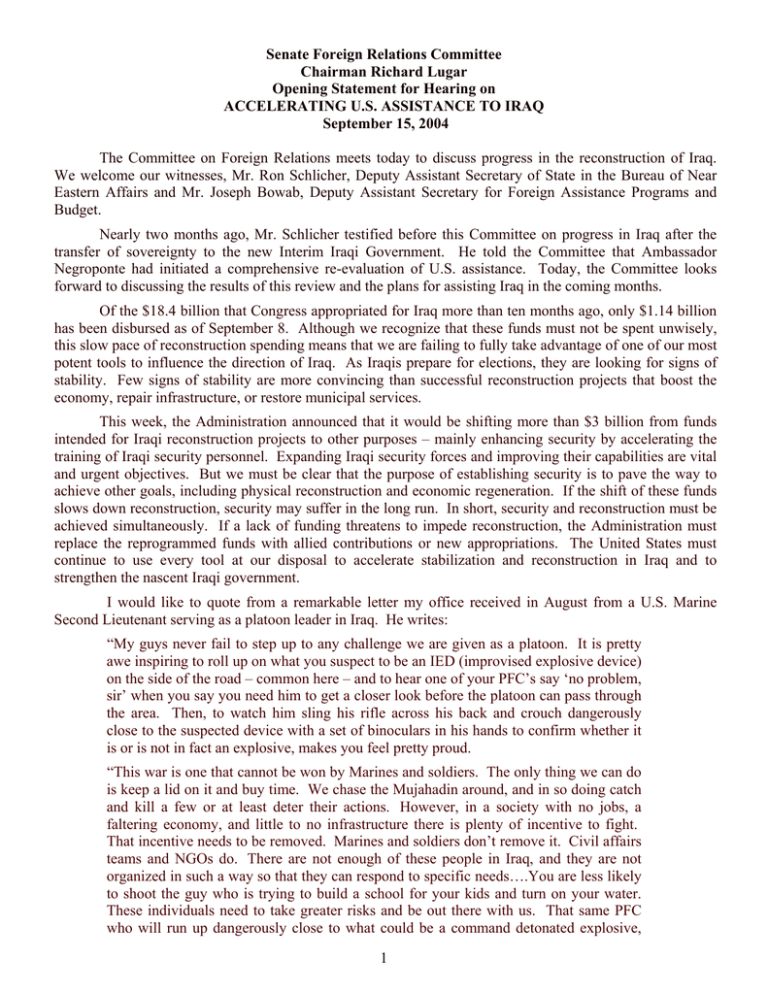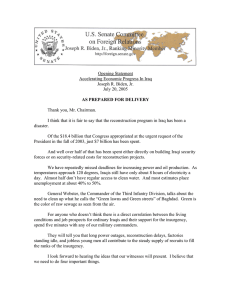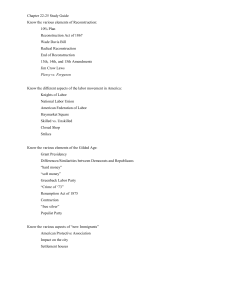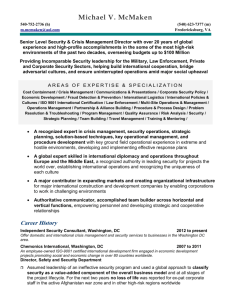Senate Foreign Relations Committee Chairman Richard Lugar Opening Statement for Hearing on
advertisement

Senate Foreign Relations Committee Chairman Richard Lugar Opening Statement for Hearing on ACCELERATING U.S. ASSISTANCE TO IRAQ September 15, 2004 The Committee on Foreign Relations meets today to discuss progress in the reconstruction of Iraq. We welcome our witnesses, Mr. Ron Schlicher, Deputy Assistant Secretary of State in the Bureau of Near Eastern Affairs and Mr. Joseph Bowab, Deputy Assistant Secretary for Foreign Assistance Programs and Budget. Nearly two months ago, Mr. Schlicher testified before this Committee on progress in Iraq after the transfer of sovereignty to the new Interim Iraqi Government. He told the Committee that Ambassador Negroponte had initiated a comprehensive re-evaluation of U.S. assistance. Today, the Committee looks forward to discussing the results of this review and the plans for assisting Iraq in the coming months. Of the $18.4 billion that Congress appropriated for Iraq more than ten months ago, only $1.14 billion has been disbursed as of September 8. Although we recognize that these funds must not be spent unwisely, this slow pace of reconstruction spending means that we are failing to fully take advantage of one of our most potent tools to influence the direction of Iraq. As Iraqis prepare for elections, they are looking for signs of stability. Few signs of stability are more convincing than successful reconstruction projects that boost the economy, repair infrastructure, or restore municipal services. This week, the Administration announced that it would be shifting more than $3 billion from funds intended for Iraqi reconstruction projects to other purposes – mainly enhancing security by accelerating the training of Iraqi security personnel. Expanding Iraqi security forces and improving their capabilities are vital and urgent objectives. But we must be clear that the purpose of establishing security is to pave the way to achieve other goals, including physical reconstruction and economic regeneration. If the shift of these funds slows down reconstruction, security may suffer in the long run. In short, security and reconstruction must be achieved simultaneously. If a lack of funding threatens to impede reconstruction, the Administration must replace the reprogrammed funds with allied contributions or new appropriations. The United States must continue to use every tool at our disposal to accelerate stabilization and reconstruction in Iraq and to strengthen the nascent Iraqi government. I would like to quote from a remarkable letter my office received in August from a U.S. Marine Second Lieutenant serving as a platoon leader in Iraq. He writes: “My guys never fail to step up to any challenge we are given as a platoon. It is pretty awe inspiring to roll up on what you suspect to be an IED (improvised explosive device) on the side of the road – common here – and to hear one of your PFC’s say ‘no problem, sir’ when you say you need him to get a closer look before the platoon can pass through the area. Then, to watch him sling his rifle across his back and crouch dangerously close to the suspected device with a set of binoculars in his hands to confirm whether it is or is not in fact an explosive, makes you feel pretty proud. “This war is one that cannot be won by Marines and soldiers. The only thing we can do is keep a lid on it and buy time. We chase the Mujahadin around, and in so doing catch and kill a few or at least deter their actions. However, in a society with no jobs, a faltering economy, and little to no infrastructure there is plenty of incentive to fight. That incentive needs to be removed. Marines and soldiers don’t remove it. Civil affairs teams and NGOs do. There are not enough of these people in Iraq, and they are not organized in such a way so that they can respond to specific needs….You are less likely to shoot the guy who is trying to build a school for your kids and turn on your water. These individuals need to take greater risks and be out there with us. That same PFC who will run up dangerously close to what could be a command detonated explosive, 1 will less willingly and adeptly build a school or turn on the power for a village. It is not in his job description. However, he will do a superior job providing security for the civilians who do perform these tasks.” What this young Lieutenant recognizes is that economic rehabilitation is not secondary to the military mission -- it is a vital and necessary component of our security strategy. Economic progress is dependent on security, but security can be improved only so much without corresponding economic gains that give the responsible majority of Iraqis a greater stake in their own future. Reconstruction progress gives Iraqis a tangible reason to hope, to take risks, and to struggle for a society that is not dominated by forces of destruction. The Lieutenant’s words also underscore the need to improve our overall capacity to stabilize failing or war-torn nations and to assist in their reconstruction, sometimes called “nation building.” Earlier this year, the Foreign Relations Committee unanimously passed the Stabilization and Reconstruction Civilian Management Act of 2004. I appreciate the State Department’s letter endorsing the purposes of S. 2127 and ask that the letter be submitted in the record. The Defense Science Board is also expected to support the legislation in a forthcoming study. The State Department has now established an Office for Reconstruction and Stabilization as called for in the legislation. The new office, headed by Carlos Pasqual, is doing a government-wide inventory of the civilian assets that might be available for stabilization and reconstruction tasks. It is also pursuing the idea proposed in S. 2127 of a Readiness Reserve to enable rapid mobilization of post-conflict stabilization personnel. In addition, I hope that the office will develop the concept of a 250-person active duty Response Readiness Corps. In Army terms, that is less than a small battalion of well-trained people -- a modest but vigorous force-multiplier that would greatly improve our nation’s stabilization capacity. This Corps would be composed of State Department and USAID employees who have the experience and technical skills to manage stabilization and reconstruction tasks in a hostile environment. As we move to improve our own civilian operations in Iraq, we must continue to press the international community for help. The recent National Conference held in Iraq resulted in a real choice of delegates. This is a good first step toward holding an election next January for a National Assembly that will draft a permanent constitution and prepare for full national elections by the end of 2005. The United Nations provided some expertise to help convene the National Conference, but it seems reluctant to provide more extensive and enduring assistance. Ambassador Qazi, the new United Nations Special Representative in Iraq, has expressed his commitment to returning UN workers to Iraq in the near future. But recent conversations with UN staff indicate that a significant UN presence will not be in place until November. I would encourage the Secretary General to move more boldly to reestablish a meaningful UN presence in Iraq. I am pleased that NATO has sent a team of 57 officers to begin training Iraqi security forces and will help rebuild Iraq’s Defense Ministry. A proposal to extend this mission, and perhaps set up a training academy in the region, is circulating among the Alliance. The United States should continue to press our allies to provide as much assistance as possible. The terrorists and insurgents must know that the world will remain steadfast despite their killing of innocents. Every terrorist act around the globe, in Madrid, Israel, Russia, Indonesia or elsewhere, reminds us that we cannot afford to let Iraq become a failed state or a haven for terrorists. Americans must reassure the Iraqis that the U.S. will remain a steady partner for the long term and that we not only share their hopes for peace and a better life, but will continue to provide assistance to help them get there. We look forward to the insights of our expert witnesses on these issues. ### 2



